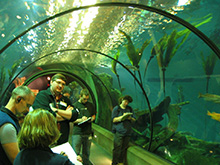Course Descriptions of our Aquarium College Courses
With only 20 to 24 new students entering the program each fall, acceptance into the Aquarium Science Program at Oregon Coast Community College is quite competitive and many of the aquarium classes in our program are academically rigorous. These comprehensive aquarium college courses provide the technical training our students need to compete and succeed in any aquatic animal industry that interests them after completion. If you’re interested in taking aquarium classes at OCCC, please review the course descriptions below. If challenging coursework and a technical, hands-on education in aquatic animal husbandry is exactly what you’re looking for, please click here to learn more about applying to the Aquarium Science Program.
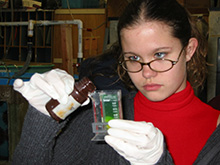 Introduction to Aquarium Science (AQS 100)
Introduction to Aquarium Science (AQS 100)
Examines the history of animal keeping and present-day aquatic animal husbandry industries. Explores the physical, chemical and biological processes occurring in the aquarium environment. Covers the proper set-up and maintenance of home aquaria.
Course Content and Outcomes Guide
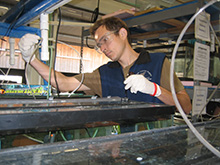 Aquarium Science Practicum 1 (AQS 110)
Aquarium Science Practicum 1 (AQS 110)
Introduces aquatic animal husbandry work environment and the care of captive aquatic animals. Emphasizes daily animal care and exhibit readiness.
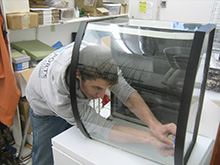 Aquarium Science Practicum 2 (AQS 111)
Aquarium Science Practicum 2 (AQS 111)
Builds upon the experiences gained in AQS 110 (Aquarium Science Practicum 1). Involves participation in a higher level of aquatic animal husbandry activities including animal health procedures, long-term record keeping and life support systems training.
Current Issues in Aquarium Science (AQS 165)
Examines the current internal and external factors that impact the operational role and function of zoological facilities with aquatic animal collections.
Introduction to Scientific Diving (AQS 186)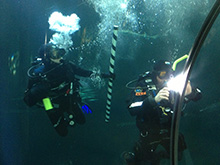
Examines the technical and safety components of scientific diving and meets all academic training requirements compliant with American Academy of Underwater Sciences (AAUS) standards. Includes professional level of emergency responder certifications, watermanship proficiency, and authorization as a surface tender to support scientific diving operations.
Course Content and Outcomes Guide
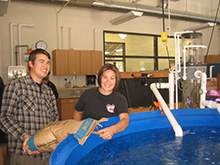 Biology of Captive Fishes (AQS 215)
Biology of Captive Fishes (AQS 215)
Examines the diversity, anatomy, physiology, sensory biology, and behavior of freshwater and marine fishes and the constraints placed upon them in a controlled environment.
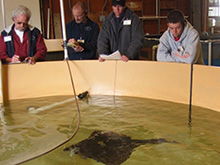 Elasmobranch Husbandry (AQS 216)
Elasmobranch Husbandry (AQS 216)
Explores the history of captive shark and ray management, current regulations, legislation and conservation of elasmobranches. Emphasizes requirements associated with keeping a healthy population of elasmobranches.
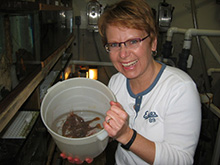 Biology of Captive Invertebrates (AQS 220)
Biology of Captive Invertebrates (AQS 220)
Presents the life history and captive care requirements of aquatic invertebrates commonly cultured and kept in the aquatic animal industry.
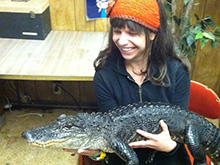 Biology of Diverse Captive Species (AQS 226)
Biology of Diverse Captive Species (AQS 226)
Examines the basic husbandry and system requirements of a broad range of phyla found in public aquariums, research, and other zoological collections. Highlights specialized needs of selected invertebrate and fish species and introduces students to challenges and considerations for reptile, amphibian, avian, and marine mammal husbandry.
Course Content and Outcomes Guide
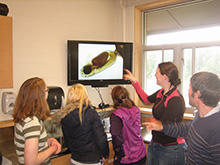 Reproduction and Nutrition
Reproduction and Nutrition
of Aquatic Animals (AQS 232)
Presents the reproductive strategies of fishes and invertebrates in a controlled environment and the manipulation of environmental and physiological parameters that initiate reproduction. Provides the fundamentals of nutrition as well as the nutritional requirements of selected aquatic animals throughout their life history. Presents industry standards for food handling and HACCP requirements.
Course Content and Outcomes Guide
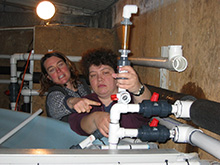 Life Support System Design and Operation (AQS 240)
Life Support System Design and Operation (AQS 240)
Examines the role of life support systems in maintaining a balanced, stable aquatic environment. Covers how to design, construct, maintain and troubleshoot semi-closed, closed and open systems.
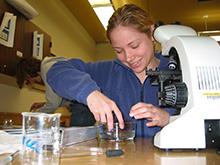 Animal Husbandry in a Research Capacity (AQS 245)
Animal Husbandry in a Research Capacity (AQS 245)
Examines the use of fish in research as well as the regulatory and ethical issues associated with this practice. Common procedures, protocols and research methodology such as husbandry, anesthesia, biopsy, blood draws, minor surgeries, field study, behavioral techniques, and euthanasia will be presented.
Course Content and Outcomes Guide
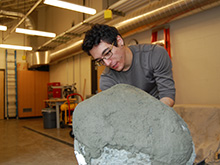 Exhibits and Interpretation (AQS 252)
Exhibits and Interpretation (AQS 252)
Introduces the principles of exhibit development and interpretive presentations. Covers projects in exhibit planning, performing interpretive presentations, and writing interpretive pieces. Emphasizes the process of developing exhibits and interpretation from conceptual statement through fabrication, performance, or publication.
Course Content and Outcomes Guide
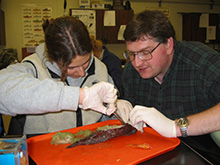 Fish and Invertebrate Health Management (AQS 270)
Fish and Invertebrate Health Management (AQS 270)
Examines the common techniques and rationale for fish and invertebrate health management. Reviews the common infectious and non-infectious diseases and disease management strategies for captive fish and invertebrates.
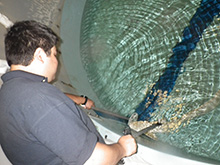 Aquarium Science Internship (AQS 295)
Aquarium Science Internship (AQS 295)
Provides the experience of daily diligence, responsibilities and rewards of the aquatic animal husbandry profession at an aquatic animal facility. Presents daily animal care and facility readiness routines, assisting life support staff and animal health management professionals, and evaluation of operational aspects of the facility.



